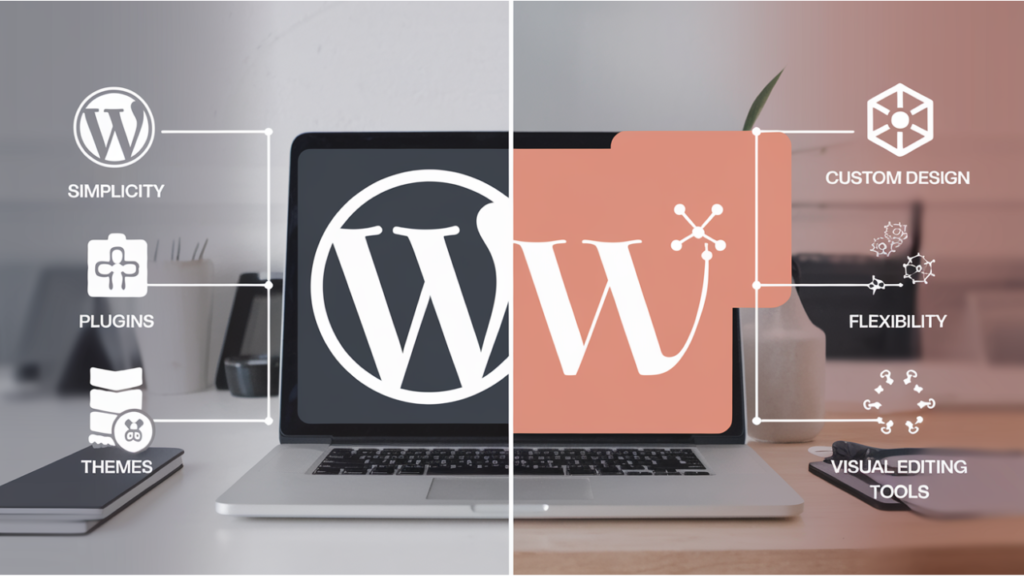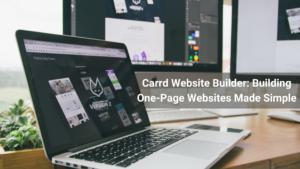WordPress vs. Webflow: Best Choice for Bloggers

Starting a blog? Choosing the right platform is crucial. In this article, we compare WordPress and Webflow to help you decide which one suits your needs. Both platforms are great, but they have different strengths. Let’s break it down.
Ease of Use
- WordPress: Known for its user-friendliness, WordPress is easy to start. Even beginners can quickly create a blog. The platform offers an intuitive dashboard, and the block editor makes writing and formatting easy.
- Webflow: Webflow has a steeper learning curve. It’s more suited for web designers or those with coding knowledge. However, its visual editor is highly customizable and great for those who want complete control over design.
If you’re new to blogging, WordPress offers a simpler experience. But if you value custom design and are willing to learn, Webflow can be a powerful tool.
Design and Customization
- WordPress: Offers a wide range of themes, both free and paid. These themes are easy to install and can be customized with plugins. However, deep customization might require coding or premium themes.
- Webflow: Gives full control over design. The visual editor lets you build your blog layout from scratch. While this is great for advanced users, it can be overwhelming for beginners.
If design flexibility is important to you, Webflow is a strong contender. If you prefer ready-made themes and plugins, WordPress is the better option.
SEO Capabilities
- WordPress: Known for its powerful SEO plugins, WordPress makes optimizing your blog easy. Plugins like Yoast SEO and All in One SEO help users rank better in search engines without needing coding skills. WordPress also has fast-loading themes that enhance performance.
- Webflow: Webflow has built-in SEO tools, allowing users to control meta titles, descriptions, and URL structures. It also has clean code, which helps with SEO. However, Webflow doesn’t have the same vast plugin library that WordPress offers.
For beginners, WordPress SEO plugins make it easier to optimize content. Webflow is good for those who want manual control over SEO.
Plugins and Integrations
- WordPress: One of the biggest strengths of WordPress is its plugin library. There are thousands of plugins for everything, from SEO to social media integration. Plugins extend the functionality of your blog without the need for coding.
- Webflow: Webflow integrates with several third-party apps but doesn’t have as many plugin options as WordPress. You may need to manually add some features or integrate external services for certain functionalities.
If you need extensive integrations and plugins, WordPress is unbeatable. Webflow’s limited plugin library might require extra effort.
Pricing
- WordPress: WordPress itself is free. However, you will need to pay for hosting, domain, and premium themes or plugins if needed. On average, the cost can be as low as $5 per month, depending on your hosting provider.
- Webflow: Webflow has a free plan, but it’s very limited. For a custom domain and full functionality, Webflow pricing starts at about $12 per month. It can be more expensive than WordPress, especially when scaling.
If budget is your concern, WordPress offers a more affordable solution. Webflow, while pricier, provides more advanced design features for those who need them.
Support and Community
- WordPress: As the most popular CMS, WordPress has a large and active community. There are countless tutorials, forums, and blogs offering tips. If you need help, it’s easy to find.
- Webflow: Webflow also has good support, with an extensive library of tutorials and a growing community. However, it’s not as large or accessible as WordPress’s community.
When it comes to support, WordPress’s large community makes it easier to find help quickly. Webflow is growing, but it may be harder to find resources as compared to WordPress.
Which is Better for Bloggers?
- Choose WordPress if you:
- Want an easy, beginner-friendly platform.
- Need a wide range of plugins.
- Have a limited budget.
- Prefer a large support community.
- Choose Webflow if you:
- Want complete control over your blog’s design.
- Have some experience with web design.
- Are okay with a higher budget.
- Prefer built-in features without relying on too many plugins.
For most new bloggers, WordPress is the better choice because of its simplicity and vast community. However, if you’re looking for advanced design flexibility, Webflow is a fantastic platform.
In conclusion, the decision between WordPress vs Webflow depends on your specific needs. Whether you want to quickly set up a blog with minimal effort or design every detail yourself, both platforms have their strengths.
Related Resources
- WordPress vs. Squarespace: Which is Right for You?
- Beginner’s Guide to Webflow for Bloggers
- How to Start a Blog with WordPress
For more insights on building websites, check out Aarvicor.
This comparison of WordPress and Webflow highlights the key factors to consider when choosing a blogging platform. Whether you’re starting out or looking to customize your blog deeply, now you have the information you need to make the right decision!
WordPress vs Webflow Best platform for bloggers Webflow for blogging WordPress blogging platform WordPress SEO vs Webflow SEO Webflow vs WordPress comparison Blogging platforms for beginners WordPress plugins for bloggers Best blog design platform Affordable blogging platform





